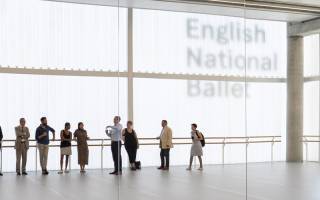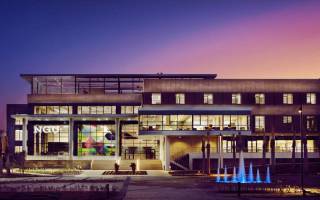Dr Celia Caulcott, Vice-Provost (Enterprise), writes about the exciting, challenging and rewarding journey in building and growing relationships with industry and innovative partners.

Universities minister Chris Skidmore recently underlined how strengthening links between universities and their partners in industry and elsewhere can ‘turbocharge economies’ at a regional, national and global level.
I was reminded of this at last month’s Royal Society conference on ‘Transforming UK translation’. Speaking about university-business partnerships, Dr Malcolm Skingle CBE, Director of Academic Liaison at GlaxoSmithKline (GSK), emphasised that ‘no single technology-driven company, however large, can be truly innovative on their own’. All companies must collaborate to survive, he added. Indeed GSK has more academic collaborations than any other UK headquartered company – with UCL being among GSK’s top HE institutional collaborators.
By the same token, I strongly believe that for many university research groups, collaborating in different ways with partners outside of academia will enhance their research and the benefits it brings to wider society*.
At UCL Innovation & Enterprise, we see these benefits played out in the real world, through the development of exciting collaborative research, teaching and innovation projects and continually evolving relationships with external partners. There are many routes to pursue these interactions, which might involve: licensing technology to companies; providing academic consultancy; exchanging knowledge; forging innovation partnerships; or helping students assess the market potential of their ideas.
Growing a partnership from small beginnings
One collaborative partnership that started small in scope, but has since flourished is with the English National Ballet (ENB). In the summer I visited the new home of the ENB at London City Island with UCL’s Provost Michael Arthur. The facility has been built specifically to enable new opportunities for collaboration – with UCL now an important partner in future plans. That relationship began a few years ago with UCL Innovation & Enterprise knowledge exchange funding, enabling UCL engineers to undertake secondments at the ENB. Now there are several collaborative projects in the works and plans to create a proposed timeline of activities for the next 10 years – for example jointly supporting the London Borough of Tower Hamlets’ ambition to become a ‘Dementia Friendly Community’ through projects that leverage the cognitive benefit of dance.
The benefits of early engagement
Students also benefit from exploring collaborative ways of working and co-developing ideas as they forge their future career paths – or their own ventures. As a UCL student, Arthur Kay came up with a business idea for turning waste coffee grounds into biofuel and established startup company
bio-bean with the help of UCL Innovation & Enterprise. He sought technical advice on biofuels from Paul Hellier in the Department of Mechanical Engineering and also forged partnerships with UCL Estates and the cafés around our campus – as well further afield with Costa Coffee.
bio-bean now recovers over 3500 tonnes of coffee grounds every year from around 900 Costa stores – and also sells its sustainable biofuel products and logs in stores and via Amazon.
The importance of establishing trust
Trust and mutual respect are of course vital ingredients in any institutional relationship, but our collaboration with Newgiza University (NGU) testifies how important that is when two partners are at different stages in their respective journeys. NGU is a rapidly growing and exciting new higher education institution launched in 2016 in New Giza, Egypt. UCL has existing established links with NGU through the ongoing collaboration on the development of undergraduate medicine, dentistry and pharmacy programmes – facilitated by UCL Consultants (part of UCL Innovation & Enterprise). More recently, NGU began to think about developing educational capacity in engineering and so came to UCL as a trusted collaborator, to help create an innovative and distinctive proposal. At the
signing of the collaboration last month, NGU President Professor Sameh Farid emphasised that one of the key elements in the success of the project was the spirit of collaboration in which UCL collectively approached the undertaking – with both institutions treating each other as equals with a sense of mutual respect from the outset.
Towards strategic partnerships
In some cases there might already be multiple existing touchpoints between different research groups at UCL and a single external organisation. Then an opportunity arises to develop and coalesce those interactions into something overarching and strategic. As an example, UCL and the London Borough of Camden already engage in a rich variety of ways, both academically and operationally. This includes the development of a clean air policy with Camden – now being implemented across the Borough – as well as the deep relationship UCL Estates has with Camden. Alongside Professor Alan Thompson, Pro-Vice-Provost (London), we are currently in the process of looking at ways we might work together more formally on a few strategically focused projects – while at the same time preserving existing collaborations.
At UCL Innovation & Enterprise we believe that these types of strategic relationships provide essential foundations from which to tackle complex social, environmental and technological challenges. Working in this way we can also be more agile, and together with our partners respond to new and changing demands and opportunities.
Going forward, UCL Innovation & Enterprise will be working with a number of key businesses, charities and public organisations in various sectors and fields whose values and goals align with our own – and where there are significant opportunities for long-term, strategic collaboration.
If you’d like to discuss the different options for collaboration with external partners and the potential wider impact of your research and teaching, I would encourage you to contact one of our teams: https://www.ucl.ac.uk/enterprise/staff
* – Data from SciVal on UCL’s published research show that the field-weighted citation index (an established measure of research impact) increases for publications with international collaborators, and more than doubles for those publications where there is a corporate partner. https://www.scival.com/





 Close
Close

